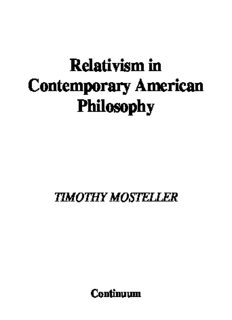
Relativism in Contemporary American Philosophy: MacIntyre, Putnam, and Rorty PDF
Preview Relativism in Contemporary American Philosophy: MacIntyre, Putnam, and Rorty
Relativism in Contemporary American Philosophy TIMOTHY MOSTELLER Continuum RELATIVISM IN CONTEMPORARY AMERICAN PHILOSOPHY Continuum Studies in American Philosophy Dorothy G. Rogers, America's First Women Philosophers Thorn Brooks and Fabian Freyerhagen (eds), The Legacy of John Rawls James Marcum, Thomas Kuhn's Revolution Joshua Rust, John Searle and the Construction of Social Reality Eve Gaudet, Quine on Meaning Douglas McDermid, The Varieties of Pragmatism RELATIVISM IN CONTEMPORARY AMERICAN PHILOSOPHY TIMOTHY MOSTELLER continuum Continuum International Publishing Group The Tower Building 80 Maiden Lane 11 York Road Suite 704 London SE1 7NX New York, NY 10038 www.continuumbooks.com © Timothy Mosteller 2006 All rights reserved. No part of this publication may be reproduced or transmitted in any form or by any means, electronic or mechanical, including photocopying, recording, or any information storage or retrieval system, without prior permission in writing from the publishers. Timothy Mosteller has asserted his right under the Copyright, Designs and Patents Act, 1988, to be identified as Author of this work. British Library Cataloguing-in-Publication Data A catalogue record for this book is available from the British Library. ISBN: 0-8264-8636-3 (hardback) Typeset by BookEns Ltd, Royston, Herts. Printed and bound in Great Britain by MPG Books Ltd., Bodmin, Cornwall Dedication To Angela with Love Acknowledgements This book would not have been possible without the patient, dedicated guidance of Harvey Siegel. I am also very grateful to Dallas Willard, J. P. Moreland, Doug Geivett and Susan Haack for their significant influence in my thinking about epistemology and the role of philosophy in well-being and well-doing. Contents 1 Epistemological Relativism Articulated 1 Introduction 1 Relativism: general statement 2 The difficulties with ER 5 Summary 15 2 Recent Attempts to Generate A Non-problematic ER 17 Introduction 17 Meiland: "No transcendence, therefore relativism" 21 Devine: "No neutrality, therefore relativism" 26 Swoyer: "No common world, therefore relativism" 32 Stich: "No cognitive norms, therefore relativism" 35 Summary 40 3 Relativistic Tensions in MacIntyre's Epistemology 45 Introduction: three key features of MacIntyre's 45 epistemology Rationality within traditions 47 Defeating traditions 57 Putnam and Rorty on MacIntyre's relativistic tensions 63 4 Relativistic Tensions in Putnam's Epistemology 77 Introduction 77 Rejection of relativism 78 Relativistic tensions in Putnam's epistemology 95 MacIntyre and Rorty on Putnam's relativistic tensions 109 Conclusion 114 5 Relativistic Tensions in Rorty's "Epistemology" 124 Introduction 124 viii Relativism in Contemporary American Philosophy Rorty's views on epistemology 124 Rorty's views on epistemology and ER 135 MacIntyre and Putnam on Rorty's relativistic tensions 141 Conclusion 148 6 Toward an ER-Free Epistemology 155 Introduction 155 The standards conjunct as a necessary condition 156 for epistemology Rejecting the no neutrality conjunct 160 Accepting local neutrality 161 Conclusion 176 Bibliography 182 Index 191 Chapter 1 Epistemoloffical Relativism Articulated Introduction Epistemological relativism has been with us from the beginning of Western philosophy. It is a powerful idea that has attracted the admiration and scorn of philosophers throughout the ages. This is no less true in twentieth-century American philosophy. This work is a critical study of epistemological relativism in the works of and the debates between three contemporary American philosophers: Alasdair MacIntyre, Hilary Putnam and Richard Rorty. These three intellectuals have contributed greatly to the discussion of the role that relativism should or should not play in an overall account of knowledge. In order to evaluate Maclntyre, Putnam and Rorty's epistemologies and their views on epistemological relati- vism, I will first argue that epistemological relativism, toward which these epistemologies tend, fails. This first chapter begins with a clarification of epistemological relativism and its difficulties. This chapter will be followed in the second chapter by a critical account of four recent attempts to overcome those difficulties. I will argue that these attempts fail. In Chapters 3, 4 and 5 I will present an exposition of the presence of epistemological relativism in the major works of Maclntyre, Putnam and Rorty, and I will examine the three-way debate between these thinkers regarding the presence of epistemological relativism in their works. In Chapter 6, I conclude with an account of how a coherent epistemology can be constructed that is free from the difficulties of epistemological relativism.
Description: